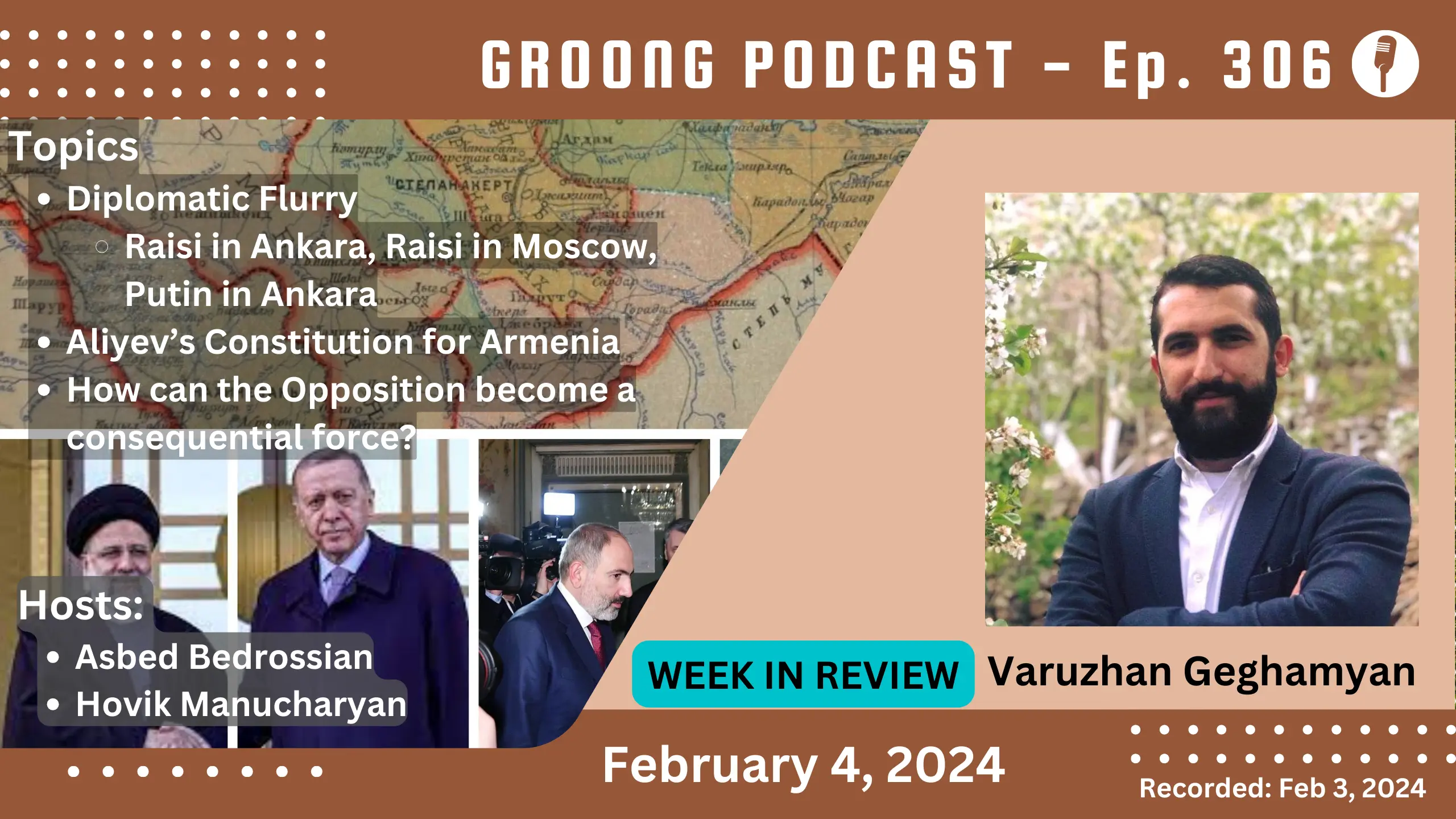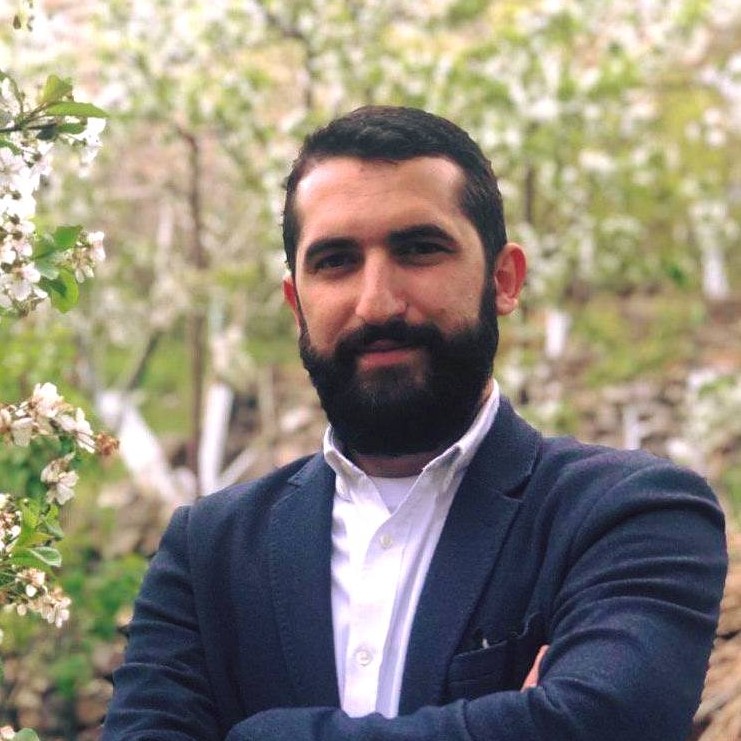Varuzhan Geghamyan - Armenian Azerbaijani Talks | Raisi Erdogan Meet in Ankara | Politics | Ep 306 - Feb 4, 2024 [EP306]
Posted on Sunday, Feb 4, 2024 | Category: Armenia, Artsakh, Azerbaijan, Iran | Series: WIR
Armenian News Network/Groong Week in Review - Feb 4, 2024
Groong Links:
Guest:
Topics:
- Diplomatic Flurry
- Raisi in Ankara
- Raisi in Moscow
- Putin in Ankara
- Aliyev’s Constitution for Armenia
- How can the Opposition become a consequential force?
Episode 306 | Recorded: February 3, 2024
Show Notes
Diplomatic Flurry
Since the 44-Day war, Iran has woken up to the new geopolitical realities, understanding that it can no longer leave the northern vector to a silent alliance with Russia. Iran has increased its diplomatic activity and military readiness, and on the economic front, as of January 1, Iran is a member of BRICS and has a sweeping free trade agreement with the EAEU. And its one border with the EAEU is with Armenia.
Raisi in Ankara
On January 24 Iranian president Ebrahim Raisi visited Ankara and held direct talks with Turkish president Erdogan. Press releases of Iran and Turkey emphasized that there were10 agreements which the two signed, primarily in the areas of railways, energy exchange, and establishment of joint commercial and communication zones. A key interest for the two countries is to increase bilateral trade to $30 billion, a 500% increase.
In addition to condemning Israeli violence in Gaza and making statements supporting the Palestinian cause, the sides discussed regional security including Syria, Iraq, Afghanistan, and the South Caucasus.
Iran’s foreign minister Hossein Amir Abdollahian was in Ankara a week before Raisi, and met with both Turkish FM Mevlut Çavušoglu, as well as Erdogan. Abdollahian referred to the discussions about the South Caucasus as “important regional issues that ultimately correlate with the security of the region” and said “more movements in this area are an important necessity today.”
When Raisi returned home, we again heard strong statements that Iran will not accept any change to International borders, alluding to the so-called Zangezur corridor through Armenia that Turkey and Azerbaijan have their eyes on.
Questions:
- Can you describe the geopolitical dance between these two regional powers, Turkey and Iran, regarding both the Middle East, and the South Caucasus? What are their main areas of interest, what are their areas of cooperation, and areas of either disagreement or competition?
- How do the negotiations over their relationship about Gaza affect their relationship towards Armenia and the South Caucasus?
- Raisi has said that Iran believes that all states should limit or stop their activities or relations with Israel, to discourage the atrocities in Gaza. Iran says Turkey should do more in this area. Given that Azerbaijan is one of Israel’s key sources of revenue and Turkey is a conduit for Azerbaijani oil & gas to Israel, how does this affect Iran’s relationship with Azerbaijan?
Raisi in Moscow
In December 2023, a month before his visit to Ankara, Raisi was in Moscow for extensive discussions with Putin, who had just returned from a visit to Saudi Arabia and the UAE. Most of the publicized topics were around Gaza, Ukraine, and the increasing economic and defense ties which are building up towards a strategic partnership between the two countries.
Questions:
- What is binding Iran and Russia so tightly, since the war in Ukraine exploded?
- Are there areas of friction between the two countries at present?
- How are Iran and Russia aligned in the South Caucasus?
- For instance, is Iran ok with Russia’s proposal to control security on the so-called “Zangezur corridor”?
Putin in Ankara
Russian president Putin will visit Erdogan in Ankara On February 12. So we can see that the major powers surrounding the South Caucasus are very active diplomatically. Turkey, Iran and Russia are the 3 majors in the so-called 3+3 platform, where the 3 minors are Armenia, Azerbaijan and Georgia.
It seems like the 3 majors are very interested in the 3+3, while the 3 minors are at best lukewarm towards it.
Questions:
- Does the 3+3 platform have a future, or is it a dead thing? And what is its goal?
- Why are the majors interested in it, and why are the minors rather disinterested?
Some of the agenda topics between Putin and Erdogan are:
- The Ukraine grain deal, which reportedly tops the agenda.
- Russia building nuclear power plants in Turkey.
- NATO and Ukraine Navy access to the Black Sea.
- Turkey as an energy and airspace communication link for Russia.
Question:
- What are the main areas of cooperation and also competition between Turkey and Russia at present? What does Putin hope to achieve in Ankara?
Aliyev’s Constitution For Armenia
2024 is only a month old and it feels like a year in Armenia given the amount of geopolitical intrigue and continued confirmations that Armenia appears to be controlled remotely from Baku.
The year began with Pashinyan getting a makeover in his looks, wearing a silly Lenin cap and going around the country checking the quality of bathrooms in public schools and dismissing governors he found responsible for shortcomings. To many analysts this looked a lot like electioneering, but Pashinyan laughed that off.
Then the clowning around in school bathrooms stopped and was dominated by news from Azerbaijan where at the highest levels, Aliyev rejected one myth after another that Pashinyan has been selling to the Armenian public.
So far, Aliyev has:
- Rejected mediation by the West in the “peace treaty” negotiations
- Rejected Pashinyan’s pleas to recognize Armenia’s territorial integrity with 29,800 sq km of area
- Rejected the idea that there should be a security guarantor to a future so-called “peace treaty”
- Demanded to receive guarantees that Armenia could never pose a military threat to Azerbaijan in the future
- Demanded 8 “villages” that he claims belong to Azerbaijan
- Continued demands about the “Z corridor”
- Promoted talk about return of Azerbaijanis to “Western Azerbaijan”, which is what he calls Armenia
- And most recently, yesterday, he said that Armenia must change its constitution as a condition for peace
Pashinyan has stacked the constitutional court in his favor starting in early 2020, and since the 44-Day war, there have been constant rumors that Azerbaijan & Turkey are pressuring Pashinyan to remove references to the Genocide, Western Armenia and Artsakh from the Armenian constitution and Declaration of Independence. Those who publicly talked about this were called conspiracy theorists until this month when Pashinyan and many of his mouthpieces came clean about their plans to scrap the current constitution, and write an entirely new one. Because Aliyev said so.
Yesterday, in an interview to Armenian Public Radio, Pashinyan said that there will never be peace if Armenia’s policy is based on the declaration of independence.
Questions:
- What is Pashinyan’s goal with the Armenian constitution and the recent apparent electioneering? Do you think he’ll aim for a constitutional referendum and maybe even elections at the same time?
- Pashinyan destroyed the third republic, so he’s talking about creating a fourth republic. Is this the right thing to do, and is he the right person for it?
In the same interview, Pashinyan referred to Armenia’s security architecture and that Armenian needs a new national security strategy and relations with Russia in the sphere of security. Specifically he said:
"Previously, 95%-97% of our defense sector relations were with Russia, now it cannot be so ... Now we have to understand what kind of relations we have, for example, with India in this concept.”
Question:
- Do you believe Pashinyan’s reasoning has any objective basis? Do you believe that the argument that some make, that Russia is busy with a war in Ukraine who has the support of the entire NATO, and therefore legitimately its hands are tied, can be a legitimate justification for Russia’s lack of military support for Armenia, even in terms of arms shipments? Do you believe that is a fair assessment or what we should bet on? And does this mean that Armenia must replace Russia as its primary partner or work to repair the relationship that existed before?
We know that the opposition has decried all of these ongoing developments vehemently. But the reality is that there has been no substantive echo from Armenian society in the republic. There is a huge disconnect between the republic and the diaspora, caused by this leadership.
Questions:
- How does the opposition become a meaningful, consequential force in Armenia under current circumstances?
Thoughts from the Panelists
- Varuzhan: Not sure that 2024 will not witness more attacks on Armenia.
Wrap-up
That’s our Week in Review, we hope you found it helpful. We invite your feedback and your suggestions, you can find us on most social media and podcast platforms. Thanks to Laura Osborn for the music on our podcasts.
Guests

Varuzhan Geghamyan
Prof. Varuzhan Geghamyan is assistant professor at Yerevan State University’s Department of Oriental Studies, teaching courses on Turkey’s modern history, History of Azerbaijan; Sociocultural anthropology of Azerbaijan; Political ideologies and parties in Modern Turkey & History of the Turkish Republic.
Hosts

Hovik Manucharyan
Hovik Manucharyan is an information security engineer who moved from Seattle to Armenia in 2022. He co-founded the ANN/Groong podcast in 2020 and has been a contributor to Groong News since the late 1990s.
Disclaimer: The views expressed by Hovik Manucharyan on the ANN/Groong podcast are his own and do not necessarily reflect the opinions of his employer or any other organization.

Asbed Bedrossian
Asbed Bedrossian is an IT professional, and for years oversaw the central IT enterprise infrastructure and services at USC. His decades of experience spanned across IT strategy, enterprise architecture, infrastructure, cybersecurity, enterprise applications, data center operations, high performance computing, ITSM, ITPM, and more.
Asbed founded the Armenian News Network Groong circa 1989/1990, and co-founded the ANN/Groong podcast in 2020.